Pathophysiology and Pharmacology Applied to Nursing Assessment Report
VerifiedAdded on 2022/12/05
|9
|2739
|359
Report
AI Summary
This report provides a comprehensive analysis of a nursing clinical scenario involving a patient experiencing chest pain and diagnosed with heart failure. It delves into the rationale for diagnostic tests like ECG and blood tests, explaining their significance in assessing the patient's condition. The report details the pathophysiology of heart failure, including its causes, progression, and potential outcomes, with specific reference to the patient, Mr. Sidhu. It examines the ECG findings, identifying the rhythm, rate, and ST segment characteristics. Furthermore, the report explores the adverse effects of medication interactions, specifically the combination of GTN and Viagra, and the factors influencing patient adherence to medication regimens. The report includes a comparison of the generic names, drug groups, mechanisms of action, and potential side effects of Atenolol and Furosemide. Finally, it discusses reasons for medication non-adherence and provides recommendations for improved patient care. The report concludes with a summary of the key findings and their implications for nursing practice.
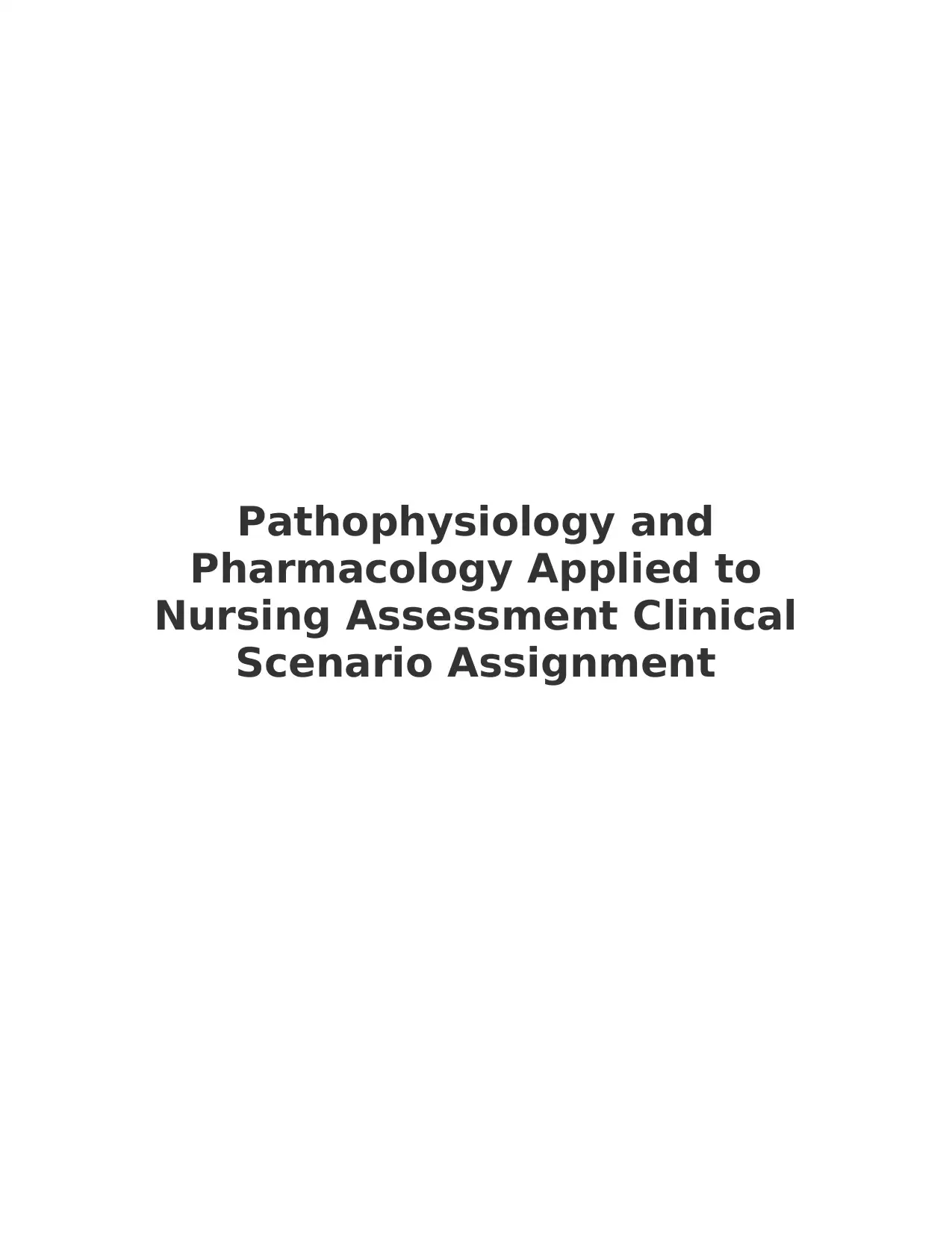
Pathophysiology and
Pharmacology Applied to
Nursing Assessment Clinical
Scenario Assignment
Pharmacology Applied to
Nursing Assessment Clinical
Scenario Assignment
Paraphrase This Document
Need a fresh take? Get an instant paraphrase of this document with our AI Paraphraser
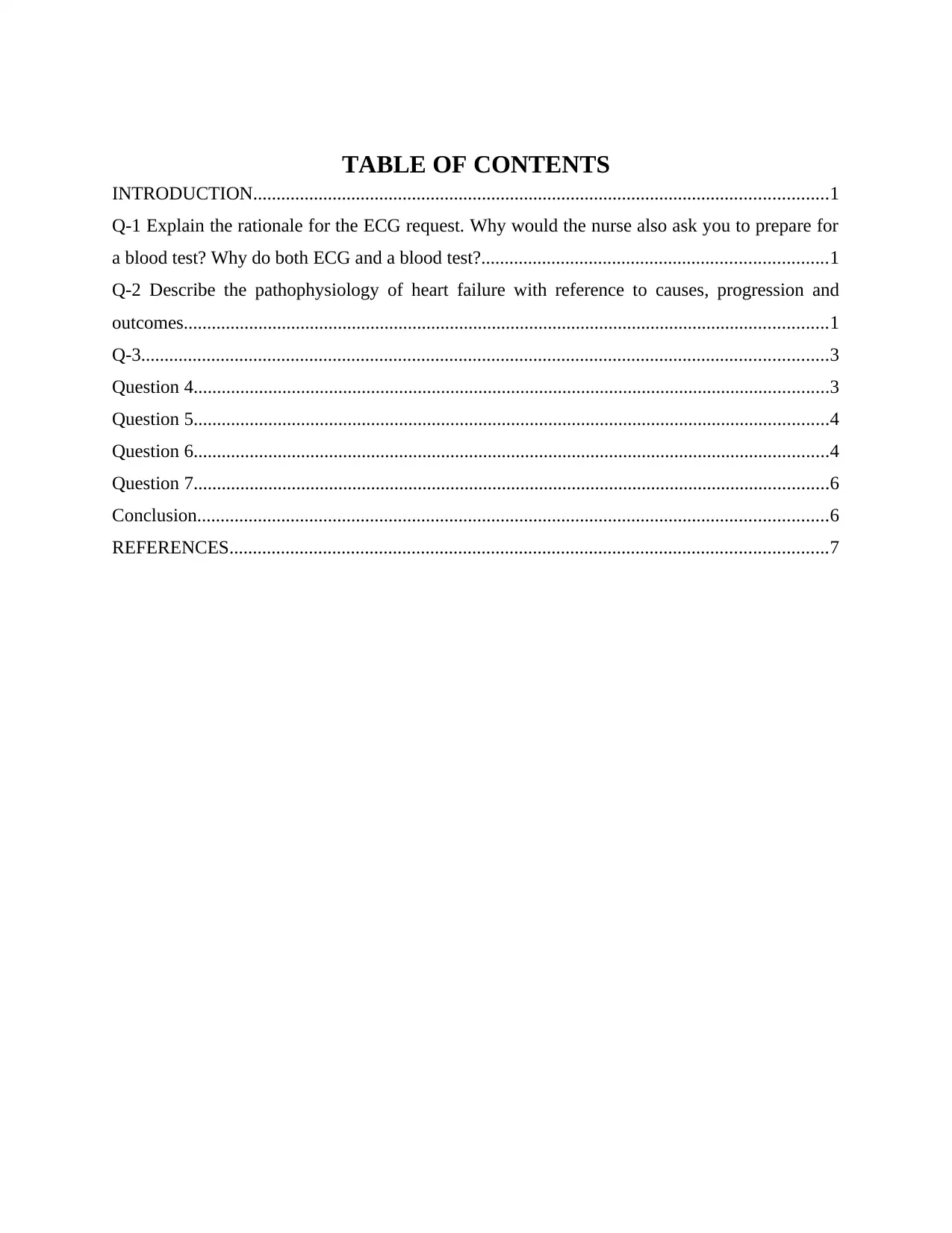
TABLE OF CONTENTS
INTRODUCTION...........................................................................................................................1
Q-1 Explain the rationale for the ECG request. Why would the nurse also ask you to prepare for
a blood test? Why do both ECG and a blood test?..........................................................................1
Q-2 Describe the pathophysiology of heart failure with reference to causes, progression and
outcomes..........................................................................................................................................1
Q-3...................................................................................................................................................3
Question 4........................................................................................................................................3
Question 5........................................................................................................................................4
Question 6........................................................................................................................................4
Question 7........................................................................................................................................6
Conclusion.......................................................................................................................................6
REFERENCES................................................................................................................................7
INTRODUCTION...........................................................................................................................1
Q-1 Explain the rationale for the ECG request. Why would the nurse also ask you to prepare for
a blood test? Why do both ECG and a blood test?..........................................................................1
Q-2 Describe the pathophysiology of heart failure with reference to causes, progression and
outcomes..........................................................................................................................................1
Q-3...................................................................................................................................................3
Question 4........................................................................................................................................3
Question 5........................................................................................................................................4
Question 6........................................................................................................................................4
Question 7........................................................................................................................................6
Conclusion.......................................................................................................................................6
REFERENCES................................................................................................................................7
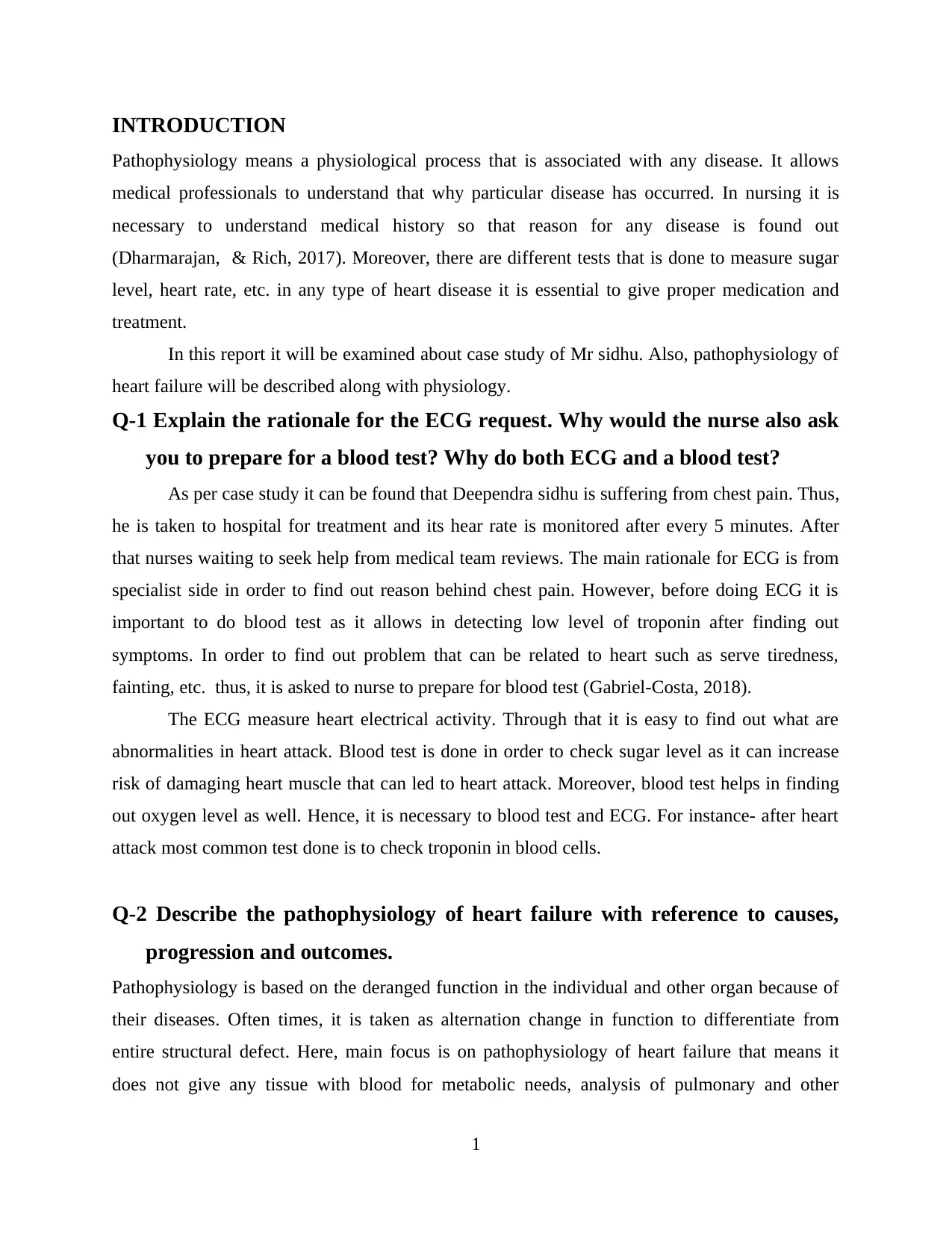
INTRODUCTION
Pathophysiology means a physiological process that is associated with any disease. It allows
medical professionals to understand that why particular disease has occurred. In nursing it is
necessary to understand medical history so that reason for any disease is found out
(Dharmarajan, & Rich, 2017). Moreover, there are different tests that is done to measure sugar
level, heart rate, etc. in any type of heart disease it is essential to give proper medication and
treatment.
In this report it will be examined about case study of Mr sidhu. Also, pathophysiology of
heart failure will be described along with physiology.
Q-1 Explain the rationale for the ECG request. Why would the nurse also ask
you to prepare for a blood test? Why do both ECG and a blood test?
As per case study it can be found that Deependra sidhu is suffering from chest pain. Thus,
he is taken to hospital for treatment and its hear rate is monitored after every 5 minutes. After
that nurses waiting to seek help from medical team reviews. The main rationale for ECG is from
specialist side in order to find out reason behind chest pain. However, before doing ECG it is
important to do blood test as it allows in detecting low level of troponin after finding out
symptoms. In order to find out problem that can be related to heart such as serve tiredness,
fainting, etc. thus, it is asked to nurse to prepare for blood test (Gabriel-Costa, 2018).
The ECG measure heart electrical activity. Through that it is easy to find out what are
abnormalities in heart attack. Blood test is done in order to check sugar level as it can increase
risk of damaging heart muscle that can led to heart attack. Moreover, blood test helps in finding
out oxygen level as well. Hence, it is necessary to blood test and ECG. For instance- after heart
attack most common test done is to check troponin in blood cells.
Q-2 Describe the pathophysiology of heart failure with reference to causes,
progression and outcomes.
Pathophysiology is based on the deranged function in the individual and other organ because of
their diseases. Often times, it is taken as alternation change in function to differentiate from
entire structural defect. Here, main focus is on pathophysiology of heart failure that means it
does not give any tissue with blood for metabolic needs, analysis of pulmonary and other
1
Pathophysiology means a physiological process that is associated with any disease. It allows
medical professionals to understand that why particular disease has occurred. In nursing it is
necessary to understand medical history so that reason for any disease is found out
(Dharmarajan, & Rich, 2017). Moreover, there are different tests that is done to measure sugar
level, heart rate, etc. in any type of heart disease it is essential to give proper medication and
treatment.
In this report it will be examined about case study of Mr sidhu. Also, pathophysiology of
heart failure will be described along with physiology.
Q-1 Explain the rationale for the ECG request. Why would the nurse also ask
you to prepare for a blood test? Why do both ECG and a blood test?
As per case study it can be found that Deependra sidhu is suffering from chest pain. Thus,
he is taken to hospital for treatment and its hear rate is monitored after every 5 minutes. After
that nurses waiting to seek help from medical team reviews. The main rationale for ECG is from
specialist side in order to find out reason behind chest pain. However, before doing ECG it is
important to do blood test as it allows in detecting low level of troponin after finding out
symptoms. In order to find out problem that can be related to heart such as serve tiredness,
fainting, etc. thus, it is asked to nurse to prepare for blood test (Gabriel-Costa, 2018).
The ECG measure heart electrical activity. Through that it is easy to find out what are
abnormalities in heart attack. Blood test is done in order to check sugar level as it can increase
risk of damaging heart muscle that can led to heart attack. Moreover, blood test helps in finding
out oxygen level as well. Hence, it is necessary to blood test and ECG. For instance- after heart
attack most common test done is to check troponin in blood cells.
Q-2 Describe the pathophysiology of heart failure with reference to causes,
progression and outcomes.
Pathophysiology is based on the deranged function in the individual and other organ because of
their diseases. Often times, it is taken as alternation change in function to differentiate from
entire structural defect. Here, main focus is on pathophysiology of heart failure that means it
does not give any tissue with blood for metabolic needs, analysis of pulmonary and other
1
⊘ This is a preview!⊘
Do you want full access?
Subscribe today to unlock all pages.

Trusted by 1+ million students worldwide
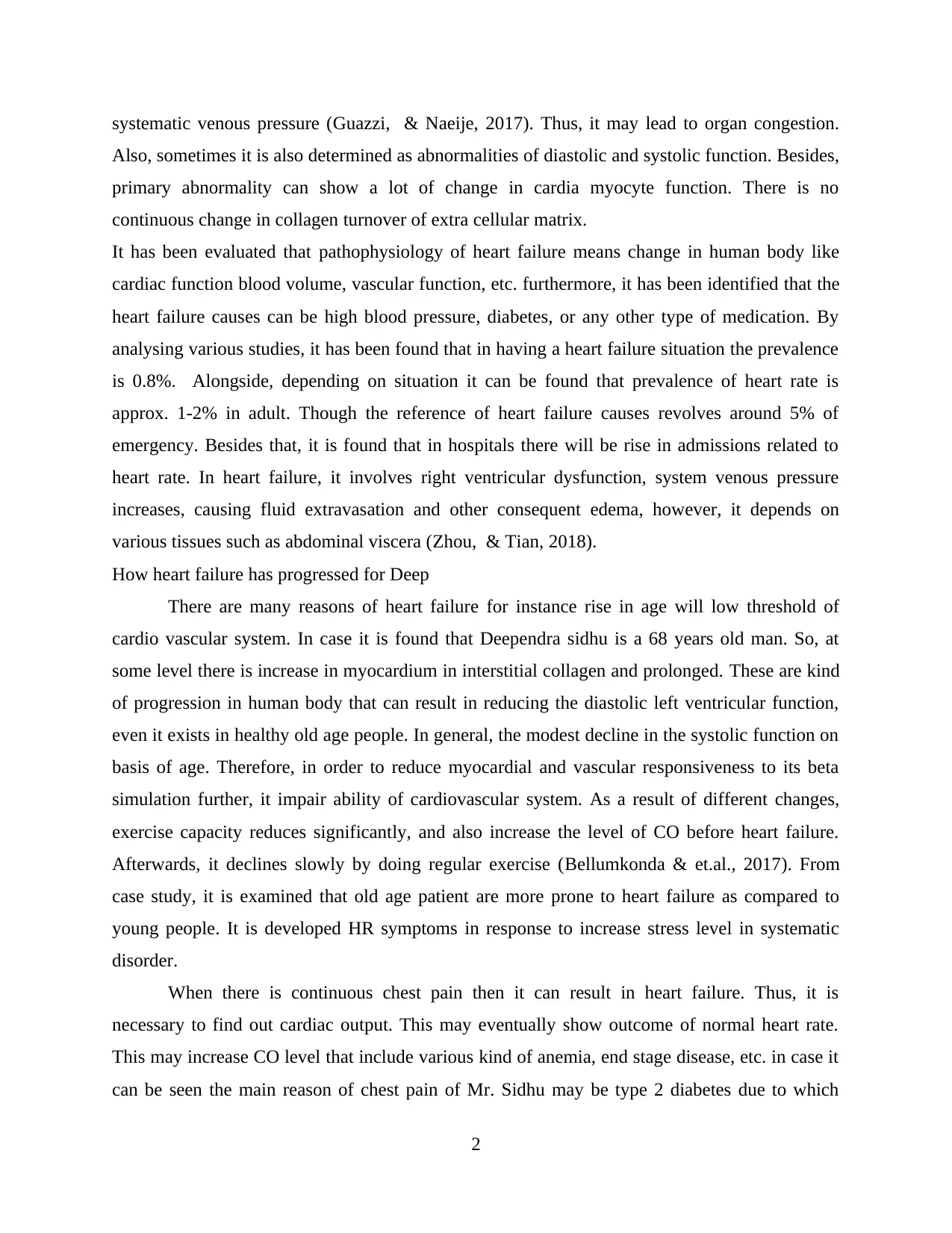
systematic venous pressure (Guazzi, & Naeije, 2017). Thus, it may lead to organ congestion.
Also, sometimes it is also determined as abnormalities of diastolic and systolic function. Besides,
primary abnormality can show a lot of change in cardia myocyte function. There is no
continuous change in collagen turnover of extra cellular matrix.
It has been evaluated that pathophysiology of heart failure means change in human body like
cardiac function blood volume, vascular function, etc. furthermore, it has been identified that the
heart failure causes can be high blood pressure, diabetes, or any other type of medication. By
analysing various studies, it has been found that in having a heart failure situation the prevalence
is 0.8%. Alongside, depending on situation it can be found that prevalence of heart rate is
approx. 1-2% in adult. Though the reference of heart failure causes revolves around 5% of
emergency. Besides that, it is found that in hospitals there will be rise in admissions related to
heart rate. In heart failure, it involves right ventricular dysfunction, system venous pressure
increases, causing fluid extravasation and other consequent edema, however, it depends on
various tissues such as abdominal viscera (Zhou, & Tian, 2018).
How heart failure has progressed for Deep
There are many reasons of heart failure for instance rise in age will low threshold of
cardio vascular system. In case it is found that Deependra sidhu is a 68 years old man. So, at
some level there is increase in myocardium in interstitial collagen and prolonged. These are kind
of progression in human body that can result in reducing the diastolic left ventricular function,
even it exists in healthy old age people. In general, the modest decline in the systolic function on
basis of age. Therefore, in order to reduce myocardial and vascular responsiveness to its beta
simulation further, it impair ability of cardiovascular system. As a result of different changes,
exercise capacity reduces significantly, and also increase the level of CO before heart failure.
Afterwards, it declines slowly by doing regular exercise (Bellumkonda & et.al., 2017). From
case study, it is examined that old age patient are more prone to heart failure as compared to
young people. It is developed HR symptoms in response to increase stress level in systematic
disorder.
When there is continuous chest pain then it can result in heart failure. Thus, it is
necessary to find out cardiac output. This may eventually show outcome of normal heart rate.
This may increase CO level that include various kind of anemia, end stage disease, etc. in case it
can be seen the main reason of chest pain of Mr. Sidhu may be type 2 diabetes due to which
2
Also, sometimes it is also determined as abnormalities of diastolic and systolic function. Besides,
primary abnormality can show a lot of change in cardia myocyte function. There is no
continuous change in collagen turnover of extra cellular matrix.
It has been evaluated that pathophysiology of heart failure means change in human body like
cardiac function blood volume, vascular function, etc. furthermore, it has been identified that the
heart failure causes can be high blood pressure, diabetes, or any other type of medication. By
analysing various studies, it has been found that in having a heart failure situation the prevalence
is 0.8%. Alongside, depending on situation it can be found that prevalence of heart rate is
approx. 1-2% in adult. Though the reference of heart failure causes revolves around 5% of
emergency. Besides that, it is found that in hospitals there will be rise in admissions related to
heart rate. In heart failure, it involves right ventricular dysfunction, system venous pressure
increases, causing fluid extravasation and other consequent edema, however, it depends on
various tissues such as abdominal viscera (Zhou, & Tian, 2018).
How heart failure has progressed for Deep
There are many reasons of heart failure for instance rise in age will low threshold of
cardio vascular system. In case it is found that Deependra sidhu is a 68 years old man. So, at
some level there is increase in myocardium in interstitial collagen and prolonged. These are kind
of progression in human body that can result in reducing the diastolic left ventricular function,
even it exists in healthy old age people. In general, the modest decline in the systolic function on
basis of age. Therefore, in order to reduce myocardial and vascular responsiveness to its beta
simulation further, it impair ability of cardiovascular system. As a result of different changes,
exercise capacity reduces significantly, and also increase the level of CO before heart failure.
Afterwards, it declines slowly by doing regular exercise (Bellumkonda & et.al., 2017). From
case study, it is examined that old age patient are more prone to heart failure as compared to
young people. It is developed HR symptoms in response to increase stress level in systematic
disorder.
When there is continuous chest pain then it can result in heart failure. Thus, it is
necessary to find out cardiac output. This may eventually show outcome of normal heart rate.
This may increase CO level that include various kind of anemia, end stage disease, etc. in case it
can be seen the main reason of chest pain of Mr. Sidhu may be type 2 diabetes due to which
2
Paraphrase This Document
Need a fresh take? Get an instant paraphrase of this document with our AI Paraphraser
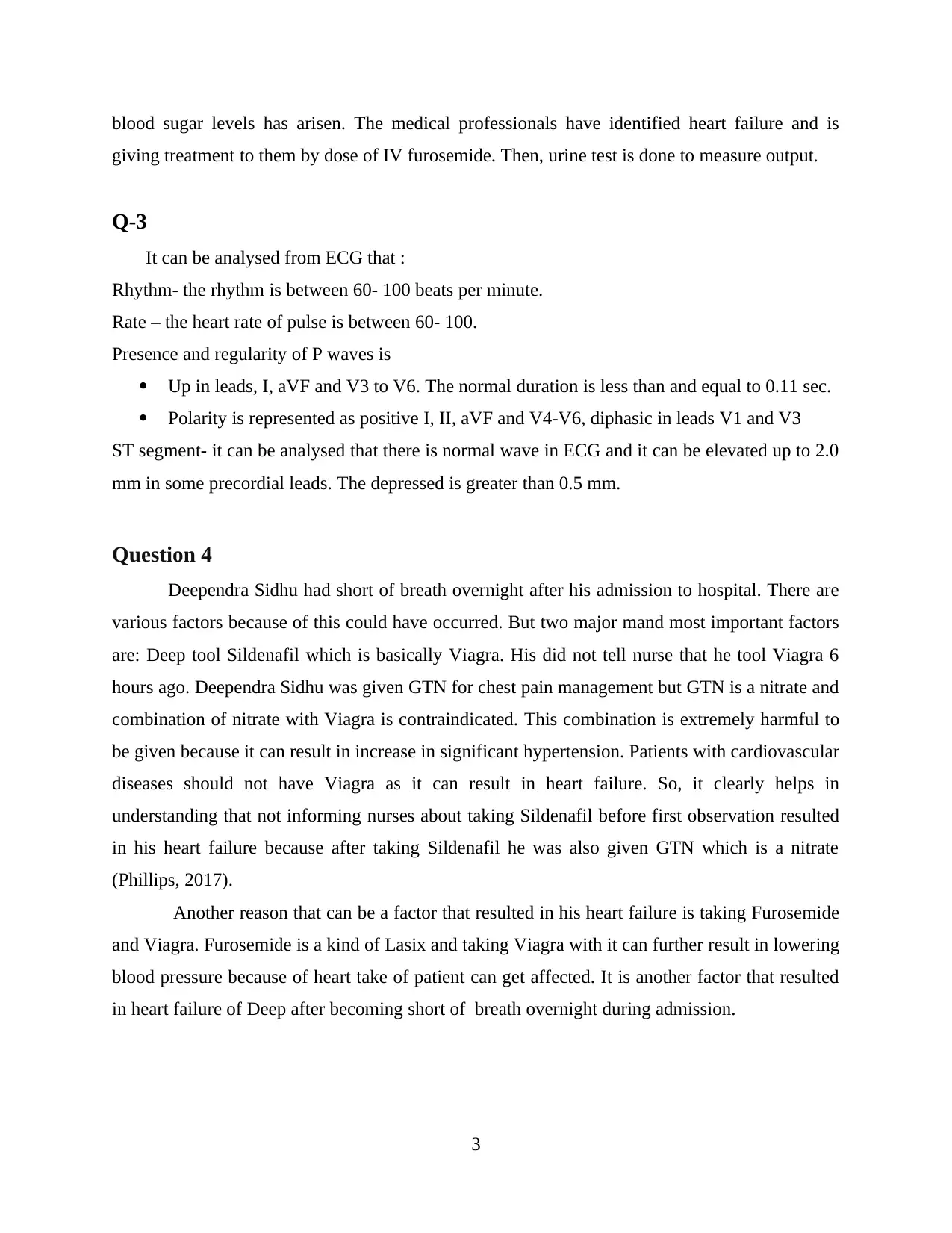
blood sugar levels has arisen. The medical professionals have identified heart failure and is
giving treatment to them by dose of IV furosemide. Then, urine test is done to measure output.
Q-3
It can be analysed from ECG that :
Rhythm- the rhythm is between 60- 100 beats per minute.
Rate – the heart rate of pulse is between 60- 100.
Presence and regularity of P waves is
Up in leads, I, aVF and V3 to V6. The normal duration is less than and equal to 0.11 sec.
Polarity is represented as positive I, II, aVF and V4-V6, diphasic in leads V1 and V3
ST segment- it can be analysed that there is normal wave in ECG and it can be elevated up to 2.0
mm in some precordial leads. The depressed is greater than 0.5 mm.
Question 4
Deependra Sidhu had short of breath overnight after his admission to hospital. There are
various factors because of this could have occurred. But two major mand most important factors
are: Deep tool Sildenafil which is basically Viagra. His did not tell nurse that he tool Viagra 6
hours ago. Deependra Sidhu was given GTN for chest pain management but GTN is a nitrate and
combination of nitrate with Viagra is contraindicated. This combination is extremely harmful to
be given because it can result in increase in significant hypertension. Patients with cardiovascular
diseases should not have Viagra as it can result in heart failure. So, it clearly helps in
understanding that not informing nurses about taking Sildenafil before first observation resulted
in his heart failure because after taking Sildenafil he was also given GTN which is a nitrate
(Phillips, 2017).
Another reason that can be a factor that resulted in his heart failure is taking Furosemide
and Viagra. Furosemide is a kind of Lasix and taking Viagra with it can further result in lowering
blood pressure because of heart take of patient can get affected. It is another factor that resulted
in heart failure of Deep after becoming short of breath overnight during admission.
3
giving treatment to them by dose of IV furosemide. Then, urine test is done to measure output.
Q-3
It can be analysed from ECG that :
Rhythm- the rhythm is between 60- 100 beats per minute.
Rate – the heart rate of pulse is between 60- 100.
Presence and regularity of P waves is
Up in leads, I, aVF and V3 to V6. The normal duration is less than and equal to 0.11 sec.
Polarity is represented as positive I, II, aVF and V4-V6, diphasic in leads V1 and V3
ST segment- it can be analysed that there is normal wave in ECG and it can be elevated up to 2.0
mm in some precordial leads. The depressed is greater than 0.5 mm.
Question 4
Deependra Sidhu had short of breath overnight after his admission to hospital. There are
various factors because of this could have occurred. But two major mand most important factors
are: Deep tool Sildenafil which is basically Viagra. His did not tell nurse that he tool Viagra 6
hours ago. Deependra Sidhu was given GTN for chest pain management but GTN is a nitrate and
combination of nitrate with Viagra is contraindicated. This combination is extremely harmful to
be given because it can result in increase in significant hypertension. Patients with cardiovascular
diseases should not have Viagra as it can result in heart failure. So, it clearly helps in
understanding that not informing nurses about taking Sildenafil before first observation resulted
in his heart failure because after taking Sildenafil he was also given GTN which is a nitrate
(Phillips, 2017).
Another reason that can be a factor that resulted in his heart failure is taking Furosemide
and Viagra. Furosemide is a kind of Lasix and taking Viagra with it can further result in lowering
blood pressure because of heart take of patient can get affected. It is another factor that resulted
in heart failure of Deep after becoming short of breath overnight during admission.
3
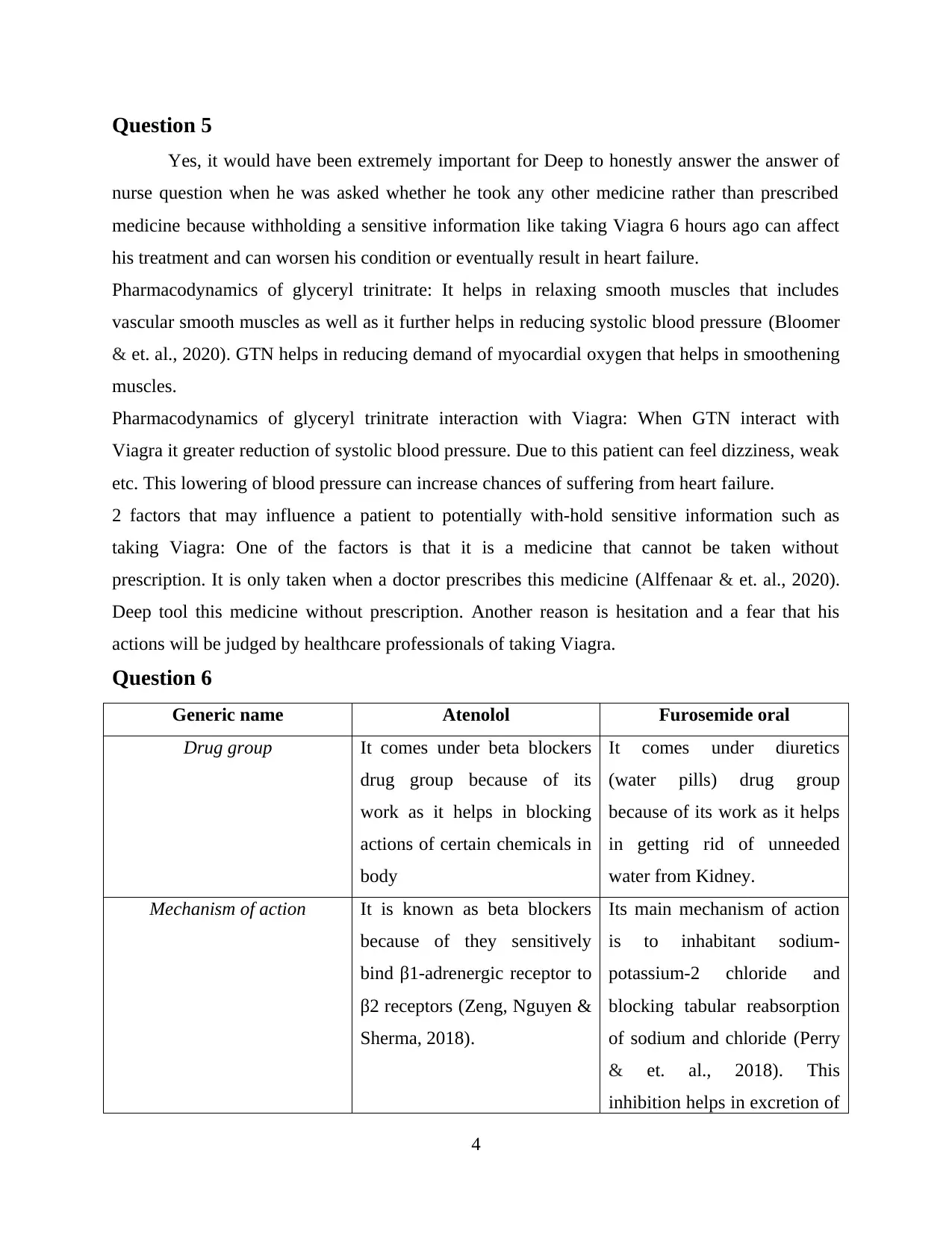
Question 5
Yes, it would have been extremely important for Deep to honestly answer the answer of
nurse question when he was asked whether he took any other medicine rather than prescribed
medicine because withholding a sensitive information like taking Viagra 6 hours ago can affect
his treatment and can worsen his condition or eventually result in heart failure.
Pharmacodynamics of glyceryl trinitrate: It helps in relaxing smooth muscles that includes
vascular smooth muscles as well as it further helps in reducing systolic blood pressure (Bloomer
& et. al., 2020). GTN helps in reducing demand of myocardial oxygen that helps in smoothening
muscles.
Pharmacodynamics of glyceryl trinitrate interaction with Viagra: When GTN interact with
Viagra it greater reduction of systolic blood pressure. Due to this patient can feel dizziness, weak
etc. This lowering of blood pressure can increase chances of suffering from heart failure.
2 factors that may influence a patient to potentially with-hold sensitive information such as
taking Viagra: One of the factors is that it is a medicine that cannot be taken without
prescription. It is only taken when a doctor prescribes this medicine (Alffenaar & et. al., 2020).
Deep tool this medicine without prescription. Another reason is hesitation and a fear that his
actions will be judged by healthcare professionals of taking Viagra.
Question 6
Generic name Atenolol Furosemide oral
Drug group It comes under beta blockers
drug group because of its
work as it helps in blocking
actions of certain chemicals in
body
It comes under diuretics
(water pills) drug group
because of its work as it helps
in getting rid of unneeded
water from Kidney.
Mechanism of action It is known as beta blockers
because of they sensitively
bind β1-adrenergic receptor to
β2 receptors (Zeng, Nguyen &
Sherma, 2018).
Its main mechanism of action
is to inhabitant sodium-
potassium-2 chloride and
blocking tabular reabsorption
of sodium and chloride (Perry
& et. al., 2018). This
inhibition helps in excretion of
4
Yes, it would have been extremely important for Deep to honestly answer the answer of
nurse question when he was asked whether he took any other medicine rather than prescribed
medicine because withholding a sensitive information like taking Viagra 6 hours ago can affect
his treatment and can worsen his condition or eventually result in heart failure.
Pharmacodynamics of glyceryl trinitrate: It helps in relaxing smooth muscles that includes
vascular smooth muscles as well as it further helps in reducing systolic blood pressure (Bloomer
& et. al., 2020). GTN helps in reducing demand of myocardial oxygen that helps in smoothening
muscles.
Pharmacodynamics of glyceryl trinitrate interaction with Viagra: When GTN interact with
Viagra it greater reduction of systolic blood pressure. Due to this patient can feel dizziness, weak
etc. This lowering of blood pressure can increase chances of suffering from heart failure.
2 factors that may influence a patient to potentially with-hold sensitive information such as
taking Viagra: One of the factors is that it is a medicine that cannot be taken without
prescription. It is only taken when a doctor prescribes this medicine (Alffenaar & et. al., 2020).
Deep tool this medicine without prescription. Another reason is hesitation and a fear that his
actions will be judged by healthcare professionals of taking Viagra.
Question 6
Generic name Atenolol Furosemide oral
Drug group It comes under beta blockers
drug group because of its
work as it helps in blocking
actions of certain chemicals in
body
It comes under diuretics
(water pills) drug group
because of its work as it helps
in getting rid of unneeded
water from Kidney.
Mechanism of action It is known as beta blockers
because of they sensitively
bind β1-adrenergic receptor to
β2 receptors (Zeng, Nguyen &
Sherma, 2018).
Its main mechanism of action
is to inhabitant sodium-
potassium-2 chloride and
blocking tabular reabsorption
of sodium and chloride (Perry
& et. al., 2018). This
inhibition helps in excretion of
4
⊘ This is a preview!⊘
Do you want full access?
Subscribe today to unlock all pages.

Trusted by 1+ million students worldwide
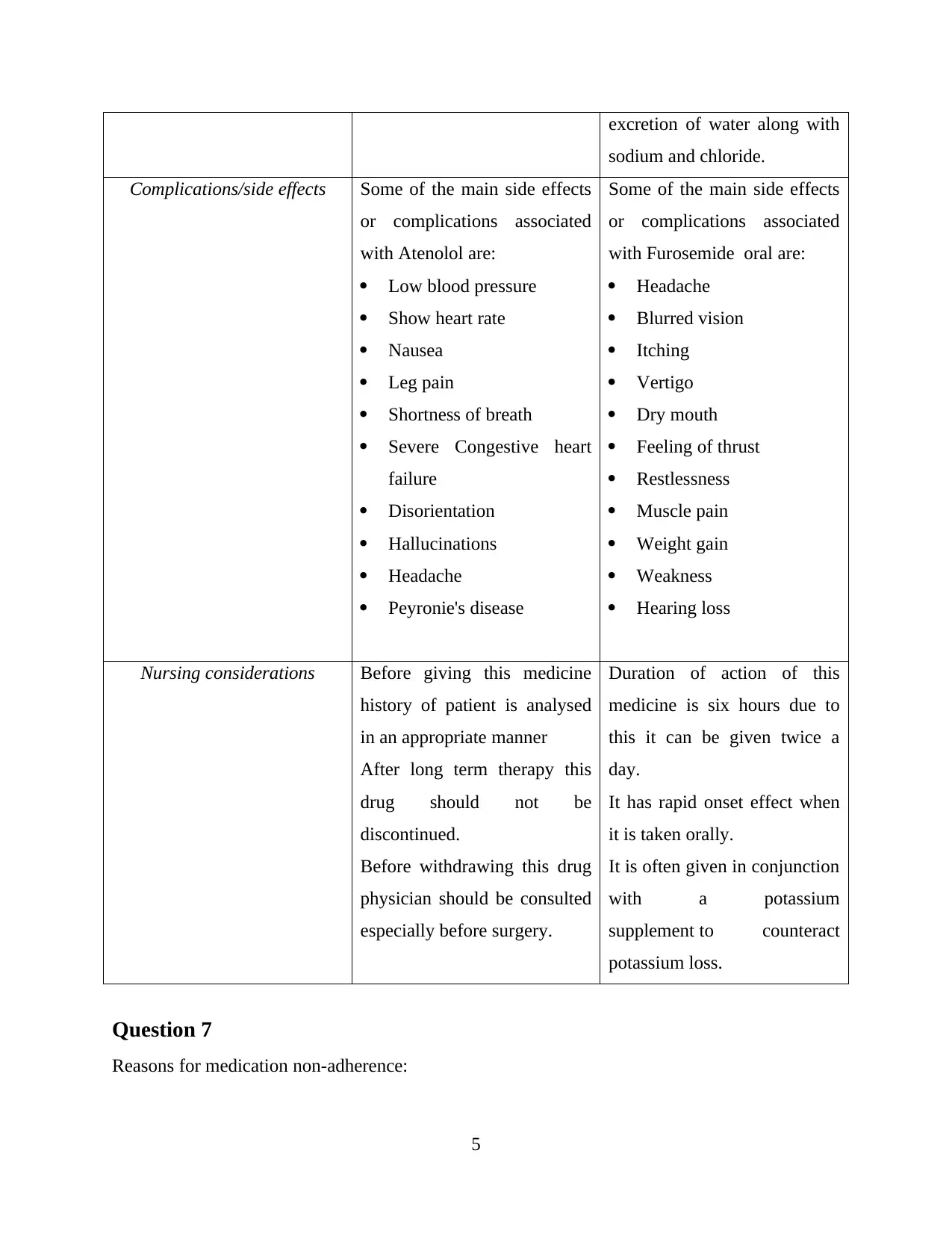
excretion of water along with
sodium and chloride.
Complications/side effects Some of the main side effects
or complications associated
with Atenolol are:
Low blood pressure
Show heart rate
Nausea
Leg pain
Shortness of breath
Severe Congestive heart
failure
Disorientation
Hallucinations
Headache
Peyronie's disease
Some of the main side effects
or complications associated
with Furosemide oral are:
Headache
Blurred vision
Itching
Vertigo
Dry mouth
Feeling of thrust
Restlessness
Muscle pain
Weight gain
Weakness
Hearing loss
Nursing considerations Before giving this medicine
history of patient is analysed
in an appropriate manner
After long term therapy this
drug should not be
discontinued.
Before withdrawing this drug
physician should be consulted
especially before surgery.
Duration of action of this
medicine is six hours due to
this it can be given twice a
day.
It has rapid onset effect when
it is taken orally.
It is often given in conjunction
with a potassium
supplement to counteract
potassium loss.
Question 7
Reasons for medication non-adherence:
5
sodium and chloride.
Complications/side effects Some of the main side effects
or complications associated
with Atenolol are:
Low blood pressure
Show heart rate
Nausea
Leg pain
Shortness of breath
Severe Congestive heart
failure
Disorientation
Hallucinations
Headache
Peyronie's disease
Some of the main side effects
or complications associated
with Furosemide oral are:
Headache
Blurred vision
Itching
Vertigo
Dry mouth
Feeling of thrust
Restlessness
Muscle pain
Weight gain
Weakness
Hearing loss
Nursing considerations Before giving this medicine
history of patient is analysed
in an appropriate manner
After long term therapy this
drug should not be
discontinued.
Before withdrawing this drug
physician should be consulted
especially before surgery.
Duration of action of this
medicine is six hours due to
this it can be given twice a
day.
It has rapid onset effect when
it is taken orally.
It is often given in conjunction
with a potassium
supplement to counteract
potassium loss.
Question 7
Reasons for medication non-adherence:
5
Paraphrase This Document
Need a fresh take? Get an instant paraphrase of this document with our AI Paraphraser
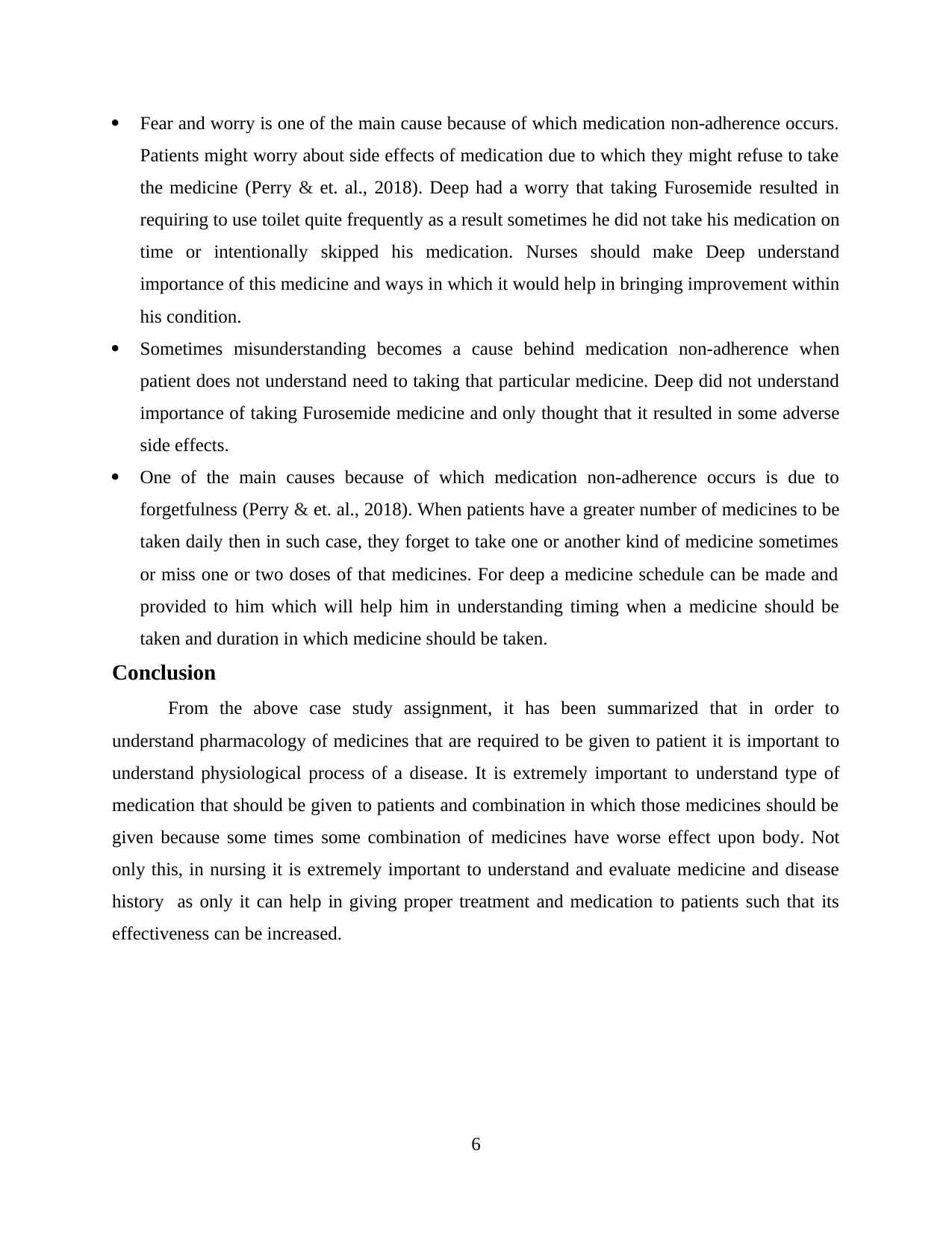
Fear and worry is one of the main cause because of which medication non-adherence occurs.
Patients might worry about side effects of medication due to which they might refuse to take
the medicine (Perry & et. al., 2018). Deep had a worry that taking Furosemide resulted in
requiring to use toilet quite frequently as a result sometimes he did not take his medication on
time or intentionally skipped his medication. Nurses should make Deep understand
importance of this medicine and ways in which it would help in bringing improvement within
his condition.
Sometimes misunderstanding becomes a cause behind medication non-adherence when
patient does not understand need to taking that particular medicine. Deep did not understand
importance of taking Furosemide medicine and only thought that it resulted in some adverse
side effects.
One of the main causes because of which medication non-adherence occurs is due to
forgetfulness (Perry & et. al., 2018). When patients have a greater number of medicines to be
taken daily then in such case, they forget to take one or another kind of medicine sometimes
or miss one or two doses of that medicines. For deep a medicine schedule can be made and
provided to him which will help him in understanding timing when a medicine should be
taken and duration in which medicine should be taken.
Conclusion
From the above case study assignment, it has been summarized that in order to
understand pharmacology of medicines that are required to be given to patient it is important to
understand physiological process of a disease. It is extremely important to understand type of
medication that should be given to patients and combination in which those medicines should be
given because some times some combination of medicines have worse effect upon body. Not
only this, in nursing it is extremely important to understand and evaluate medicine and disease
history as only it can help in giving proper treatment and medication to patients such that its
effectiveness can be increased.
6
Patients might worry about side effects of medication due to which they might refuse to take
the medicine (Perry & et. al., 2018). Deep had a worry that taking Furosemide resulted in
requiring to use toilet quite frequently as a result sometimes he did not take his medication on
time or intentionally skipped his medication. Nurses should make Deep understand
importance of this medicine and ways in which it would help in bringing improvement within
his condition.
Sometimes misunderstanding becomes a cause behind medication non-adherence when
patient does not understand need to taking that particular medicine. Deep did not understand
importance of taking Furosemide medicine and only thought that it resulted in some adverse
side effects.
One of the main causes because of which medication non-adherence occurs is due to
forgetfulness (Perry & et. al., 2018). When patients have a greater number of medicines to be
taken daily then in such case, they forget to take one or another kind of medicine sometimes
or miss one or two doses of that medicines. For deep a medicine schedule can be made and
provided to him which will help him in understanding timing when a medicine should be
taken and duration in which medicine should be taken.
Conclusion
From the above case study assignment, it has been summarized that in order to
understand pharmacology of medicines that are required to be given to patient it is important to
understand physiological process of a disease. It is extremely important to understand type of
medication that should be given to patients and combination in which those medicines should be
given because some times some combination of medicines have worse effect upon body. Not
only this, in nursing it is extremely important to understand and evaluate medicine and disease
history as only it can help in giving proper treatment and medication to patients such that its
effectiveness can be increased.
6
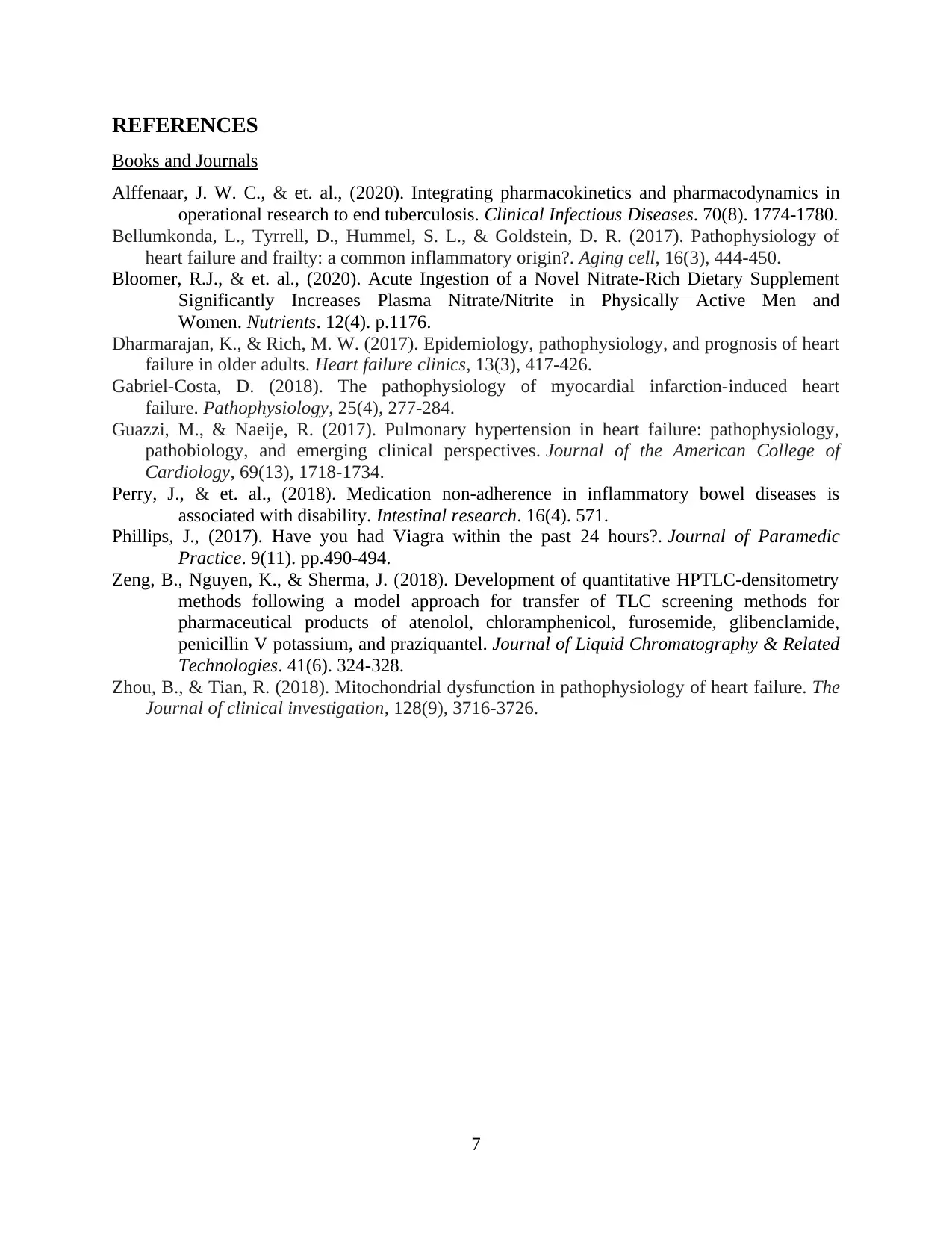
REFERENCES
Books and Journals
Alffenaar, J. W. C., & et. al., (2020). Integrating pharmacokinetics and pharmacodynamics in
operational research to end tuberculosis. Clinical Infectious Diseases. 70(8). 1774-1780.
Bellumkonda, L., Tyrrell, D., Hummel, S. L., & Goldstein, D. R. (2017). Pathophysiology of
heart failure and frailty: a common inflammatory origin?. Aging cell, 16(3), 444-450.
Bloomer, R.J., & et. al., (2020). Acute Ingestion of a Novel Nitrate-Rich Dietary Supplement
Significantly Increases Plasma Nitrate/Nitrite in Physically Active Men and
Women. Nutrients. 12(4). p.1176.
Dharmarajan, K., & Rich, M. W. (2017). Epidemiology, pathophysiology, and prognosis of heart
failure in older adults. Heart failure clinics, 13(3), 417-426.
Gabriel-Costa, D. (2018). The pathophysiology of myocardial infarction-induced heart
failure. Pathophysiology, 25(4), 277-284.
Guazzi, M., & Naeije, R. (2017). Pulmonary hypertension in heart failure: pathophysiology,
pathobiology, and emerging clinical perspectives. Journal of the American College of
Cardiology, 69(13), 1718-1734.
Perry, J., & et. al., (2018). Medication non-adherence in inflammatory bowel diseases is
associated with disability. Intestinal research. 16(4). 571.
Phillips, J., (2017). Have you had Viagra within the past 24 hours?. Journal of Paramedic
Practice. 9(11). pp.490-494.
Zeng, B., Nguyen, K., & Sherma, J. (2018). Development of quantitative HPTLC-densitometry
methods following a model approach for transfer of TLC screening methods for
pharmaceutical products of atenolol, chloramphenicol, furosemide, glibenclamide,
penicillin V potassium, and praziquantel. Journal of Liquid Chromatography & Related
Technologies. 41(6). 324-328.
Zhou, B., & Tian, R. (2018). Mitochondrial dysfunction in pathophysiology of heart failure. The
Journal of clinical investigation, 128(9), 3716-3726.
7
Books and Journals
Alffenaar, J. W. C., & et. al., (2020). Integrating pharmacokinetics and pharmacodynamics in
operational research to end tuberculosis. Clinical Infectious Diseases. 70(8). 1774-1780.
Bellumkonda, L., Tyrrell, D., Hummel, S. L., & Goldstein, D. R. (2017). Pathophysiology of
heart failure and frailty: a common inflammatory origin?. Aging cell, 16(3), 444-450.
Bloomer, R.J., & et. al., (2020). Acute Ingestion of a Novel Nitrate-Rich Dietary Supplement
Significantly Increases Plasma Nitrate/Nitrite in Physically Active Men and
Women. Nutrients. 12(4). p.1176.
Dharmarajan, K., & Rich, M. W. (2017). Epidemiology, pathophysiology, and prognosis of heart
failure in older adults. Heart failure clinics, 13(3), 417-426.
Gabriel-Costa, D. (2018). The pathophysiology of myocardial infarction-induced heart
failure. Pathophysiology, 25(4), 277-284.
Guazzi, M., & Naeije, R. (2017). Pulmonary hypertension in heart failure: pathophysiology,
pathobiology, and emerging clinical perspectives. Journal of the American College of
Cardiology, 69(13), 1718-1734.
Perry, J., & et. al., (2018). Medication non-adherence in inflammatory bowel diseases is
associated with disability. Intestinal research. 16(4). 571.
Phillips, J., (2017). Have you had Viagra within the past 24 hours?. Journal of Paramedic
Practice. 9(11). pp.490-494.
Zeng, B., Nguyen, K., & Sherma, J. (2018). Development of quantitative HPTLC-densitometry
methods following a model approach for transfer of TLC screening methods for
pharmaceutical products of atenolol, chloramphenicol, furosemide, glibenclamide,
penicillin V potassium, and praziquantel. Journal of Liquid Chromatography & Related
Technologies. 41(6). 324-328.
Zhou, B., & Tian, R. (2018). Mitochondrial dysfunction in pathophysiology of heart failure. The
Journal of clinical investigation, 128(9), 3716-3726.
7
⊘ This is a preview!⊘
Do you want full access?
Subscribe today to unlock all pages.

Trusted by 1+ million students worldwide
1 out of 9
Related Documents
Your All-in-One AI-Powered Toolkit for Academic Success.
+13062052269
info@desklib.com
Available 24*7 on WhatsApp / Email
![[object Object]](/_next/static/media/star-bottom.7253800d.svg)
Unlock your academic potential
Copyright © 2020–2026 A2Z Services. All Rights Reserved. Developed and managed by ZUCOL.





